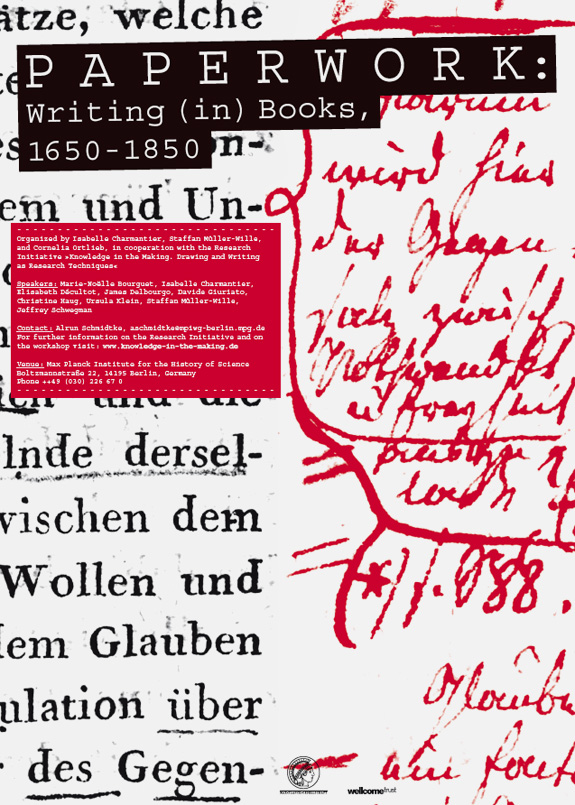

Max Planck Institute for the History of Science, June 17, 2010
Organized by Isabelle Charmantier (Exeter), Cornelia Ortlieb (Berlin) and Staffan Müller-Wille (Exeter) in cooperation with the Research Initiative »Knowledge in the Making.«
Many of the techniques which were developed to deal with this dynamic situation have been studied in the context of a history of reading and history of the book: the use of marginalia, of commonplace books, or of index cards. But such techniques were also used by writers in order to organise, classify and arrange their material, be it in a scientific or in a literary context. How did writers – who were also readers, of course – cope with the expansion of knowledge, the vast volume of printed books, and the acceleration in the circulation of information? Is it possible to discern certain stages or patterns that lead from the taking of preliminary notes to the production of a ›final‹ manuscript? How did methods of creating and ordering annotations shape the ›final‹ product – be it printed or not? What impact did developments in one discipline have in another? For instance, the commonplace book, a characteristic humanist tool of the Renaissance used to organise one's reading notes, was taken up by Bacon to advocate the collection of ›real‹ data from the natural world, and was further developed and popularised by John Locke nearly a century later. The commonplace book went from being a rigid tool centred on fixed themes or loci in the seventeenth century, to a more fluid and personal method of compiling information in the eighteenth century.
Many other information systems went from being fixed to mobile throughout the period, reflecting the development of what Décultot has called ›an individual ars excerpendi.‹ Note-taking became more personal throughout the eighteenth century, freeing itself from the imposed loci of the seventeenth century. Did this development in collecting and ordering information have any consequences on the act of writing? Did it affect all genres and disciplines in the same way? And how was it perceived to affect the art of memory? The workshop will focus on this period of emancipation from the humanist loci and try to investigate what the consequences were for the organised production of knowledge. Several themes can be developed along these lines, amongst others: the different ways in which manuscripts and printed material were related through marginalia, glosses, or footnotes; the continuum between writing and drawing and the use of paper to represent often complex information in a two-dimensional manner (lists, tables, diagrams, maps); the use of classificatory tools – both on paper (commonplace books, index cards) and spatially in terms of where to situate one text amongst others (filing cabinets, libraries); and the role of memory in writing.
The workshop aims to explore the many ways in which writing was done in early modern Europe. By bringing together scholars from different disciplines such as the history of the book, of information technologies, of print culture, or history of natural history, we hope to extract some interesting and challenging conclusions about the act of writing in the late seventeenth and eighteenth centuries.
Speakers: Marie-Noëlle Bourguet (Paris), Isabelle Charmantier (Exeter), Elisabeth Décultot (Paris), James Delbourgo (New Brunswick), Davide Giuriato (Frankfurt/ M.), Christine Haug (Munich), Staffan Müller-Wille (Exeter).
Comments: Ursula Klein (Berlin), Jeffrey Schwegman (Berlin).
Contact: Alrun Schmidtke, aschmidtke|at|mpiwg-berlin.mpg.de
 Program
–
PDF-File,
421.6 KB
Program
–
PDF-File,
421.6 KB